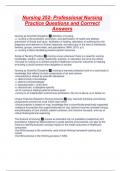Nursing 252- Professional Nursing
Practice Questions and Corrrect
Answers
Nursing as Scientific Discipline ✅-defintion of nursing
<> nursing is the protection, promotion, and optimization of health and abilities,
prevention of illness and injury, facilitation of healing, alleviation of suffering thru the
diagnosis and treatment of human response, and advocacy in the care of individuals,
families, groups, communities, and populations (ANA, 2015, p.1)
<> nursing is about facilitating positive patient outcomes
Scope of Nursing Practice ✅-nursing occurs whenever there is a need for nursing
knowledge, wisdom, caring, leadership, practice, or education any time any where
-the goal of nursing is to achieve positive healthcare consumer outcomes in keeping
w/nursing is social contract w/an obligation to society
Nursing as Scientific Discipline ✅-nursing is learned profession built on a core body of
knowledge that reflects its dual components of art and science
-characteristics shared by scientific disciplines
<> distinct body of knowledge
<> distinct schools/colleges
<> baccalaureate = entry level
<> doctoral edu. is discipline specific
-art of nursing is helping patients achieve goals
-nursing is an independent autonomous profession. No one is above us or below us.
Unique Features Related to Nursing Science ✅-nsg. has both scholarly and clinical
components and the two must inform each other
-clinical practice is based on msg. knowledge that is scientifically/empirically supported
-evidence for practice (the support/rationale for nsg. actions) must be consistent w/nsg.
and philosophy of care (holistic, patient centered, and outcome focused), and use of
critical thinking/clinical reasoning
The Science of Nursing ✅-nurses as scientists rely on qualitative (subjective) and
quantitative (objective) data/evidence to guide policies and practices, but also as the
means to identify/evaluate nursings impact on the health outcomes of healthcare
consumers
-the NSG process is the commonly used critical thinking framework used by prof.
nurses
-the NSG process is the thinking process in NSG
,Specialty to Practice: Advanced Practice Registered Nurses (APRN) ✅-to be certified
(beyond the nursing license) as an advance practice R.N. (APRN), currently the min.
edu. is a masters in nursing (soon to be DNP)
-4 recognized APRN clinical roles
<> clinical nurse specialist
<> nurse anesthetist
<> nurse midwife
<> nurse practitioner
Other Non-APRN Masters Level NSG edu ✅-there are other masters level nurses who
are not APRN/their graduate NSG edu. isn't recognized as one of the APRN roles
-exp. of masters level edu that isn't APRN
<> nsg. edu. - forensic NSG - NSG informatics
NSG's Scientific/Scholarly Forms of Communication ✅-communicate via writing
<> scholarly prof. papers
<> clinical documentation that reflects use of NSG process
-communicate via speaking
<> scholarly presentations
<> clinical presentations
*CHAPTER 2: Critical Thinking in NSG practice* ✅
Nurses are ✅-independent/autonomous professionals
-expected to provide patient centered/outcome focused care
-responsible for providing care that is scientifically/empirically based
-the basis of scientific inquiry is critical thinking
Critical Thinking and its relationship to nursing ✅-nurses must be able to think critically
in order to solve problems/deal with issues and implement the best strategies for each
patient's needs
-critical thinking in nursing means that nurses need to think of clinical issues/situations
using inquiring minds as sources of scientific information
Critical Thinking Competencies ✅-involves 6 competencies
<> interpretation: the ability to understand and identify problems
<> analysis: the ability to examine, organize, classify, categorize, and prioritize variables
<> evaluation: the ability to assess the credibility, significance, and applicability of
sources of information necessary to support conclusions or draw conclusions based on
evidence
<> explanationL the ability to describe the assumptions that led to the conclusions
reached
<> self regulation: the ability to self examine and self correct
, Clinical Decision Making ✅-as you develop into a professional nurse, it is important to
acquire critical thinking skills that allow you to face each new patient care
experience/situation w/open mindedness, creativity, confidence, and inquiry
-every clinical situation presents an opportunity for nurses to think critically in order to
make sound judgements about the nursing care to be planned/implemented
Nurses: provide patient centered, outcome focused care ✅
Learning to Think Critically ✅-C.T. isn't a simple step by step linear process that is
easily taught or learned
-it is a process gained only thru experience and an active curiosity towards learning
Critical Thinking and Learning ✅-thinking and learning about nursing are inter related,
life long processes inter related, life-long processes
-you will learn more about nursing after you get out of school than during. You learn as
you gain clinical experience dealing w/patient issues/nursing phenomena
Critical Thinking in Nursing ✅-a C.T. Nurse considers what is important in a situation,
mentally explores alternatives, considers ethical principles, and then makes informed
decisions regarding planning and implementing care to attain (+) patient outcomes
-C.T. in nursing is always outcomes focused + driven by the patient's family's needs (not
the nurses)
Critical Thinking in Nursing = 3 Levels ✅-critical thinking evolves w/experience
-the 3 levels of C.T. in nursing are basic, complex, and commitment
Basic Critical Thinking ✅-basic or novice thinking tends to be concrete, task oriented,
and based on a set of rules or principles
-a basic critically thinking nurse accepts the values/beliefs/behaviors/etc. of others and
believes experts have right answers for every problem
- = undergraduate nursing students/new BSN grads
<> takes 1-2 years to not be considered new nurse
Basic to Complex Thinking ✅-mvm. to next level of C.T. is not automatic; one must
have experience and flexible attitudes about learning
-complex C.T. separate themselves from experts by analyzing the situation and
examining choices more independently
-complex critical thinkers recognize each solution has benefits and risks to be
considered
Complex Critical Thinking ✅-thinking becomes more creative and innovative
-the complex critical thinker is willing to consider different options from routine
procedures when complex situations develop
- = a BSN nurse w/2years clinical experience




